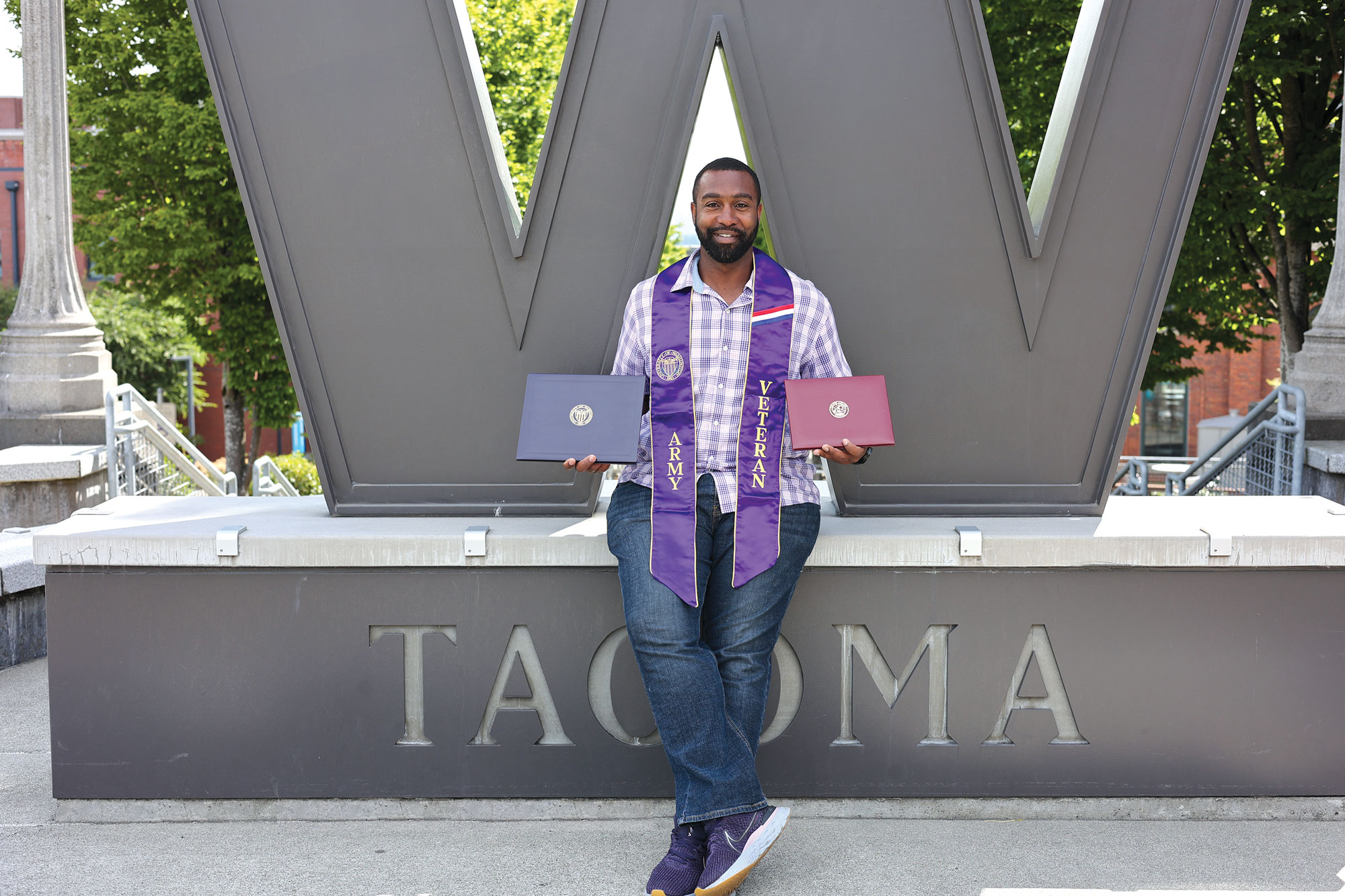Joe Davis shares his insights as a veteran, first-generation college student and UW Tacoma alumnus

Joe Davis didn’t grow up thinking he’d go to college. But after serving in the Army, he saw it as a pathway to a career in public service and law enforcement.
Joe Davis, ’16, is the first president of the UW Alumni Association to have graduated from UW Tacoma. A military veteran, he transferred to the Tacoma campus from Pierce College, where he had enrolled after serving in the Army. Today he is a deputy sheriff in Snohomish County. He shared some highlights of his Tacoma experience with UW Magazine.
What drew you to UW Tacoma?
It has a small-school feel. Our average class size was 16 to 1. In my organic chemistry class, there were like 30 people, and I know at the UW in Seattle, that organic chemistry class is a lecture hall of 300 people. My teacher, Dr. Meg Henderson, would just say, “Hey, these are my office hours—you guys are free to come by.” All of my professors were extremely supportive. Dr. Jutta Heller was absolutely amazing. She emigrated from Germany and was a first-generation college student. She had a huge compassion for first-generation students, and taking molecular biology with her, she was always patient, and she made learning fun.
What did you appreciate about UWT?
It’s an urban-serving campus. It’s the only university in the state of Washington that is part of the Coalition of Urban Serving Universities. Specifically, UW Tacoma helped revitalize downtown tacoma. And it’s mainly a commuter campus. And the high veteran population, obviously, being military myself.
But what I really appreciate about it is the room for growth. I know a lot of people haven’t seen it, but there’s the big W. That W is the center of campus, and there are several blocks west that UW Tacoma owns with the ability to expand. So right now, I believe there are 5,000 matriculated students, and the hope is to grow to 10,000 someday.
UW Tacoma, we’re just unique. The first “W” was built by a group of alumni on the Seattle campus. But that “W” – when UW Tacoma decided to build ours, we went to all the other Ws around the whole campus and measured them, and we made ours one inch taller than everybody else’s. We technically have the tallest W in the system!
Why is there a higher veteran population at UW Tacoma?
I believe being close to Joint Base Lewis-McChord is the primary reason, but I also think the leaders of UW Tacoma did a really good job having that relationship with the leaders of JBLM to set that precedence. You can be close by, but it doesn’t mean you’re necessarily maximizing the potential you have there. So yes, proximity is a driving factor, but more importantly, it’s the forethought of the leaders of UW Tacoma who set a priority to educate veterans.
You reached out to the UW to get involved after finishing your degree. What made you do that?
I’m proud of graduating college, specifically from the University of Washington, and more specifically from UW Tacoma. I wanted to stay involved. I’ve always been the type of person who is not going to wait for someone to approach me. I’m going to seek out opportunities. Right off the bat, I bought a life membership without knowing anything about the UWAA.
I also asked what opportunities there were to get involved and heard about representing UW Tacoma on the UWAA Board of Trustees. I was like, whatever it is, sign me up—I’ll learn about it.
As for the UW community… a lot of things divide people. I joined the military at a young age. I grew up in an environment where I saw [diversity], and then joining the military, you were still surrounded by that. Skin color, sexual orientation, none of that really deterred me. I’ve never viewed that as a barrier. but what I can appreciate about the UW is that we’re all family. It’s just another thing that binds us together.
It’s hard to explain, but when you see another service member or veteran, you have an immediate rapport with them. I feel the same way when it comes to being a graduate of the UW. It doesn’t matter where you’re at in the community—if you see someone with a UW hat on, you’re like, “Hey! I like the hat!” It’s a huge community, and I really appreciate that.
What advice do you have for fellow veterans or fellow non-traditional college students?
Keep that drive and ambition and organization we were taught as service members. Remember the end goal. But also remember there are different ways to get there. Ana Mari Cauce has talked about nontraditional paths to the UW, and I embody that nontraditional path. I was a veteran student who started off taking online classes, and then I got deployed, and when I finished deployment, I went to school full-time at a community college and transferred to UW Tacoma and graduated from UW Tacoma. But I still have the same degree as everyone else has, and I would argue that I had a better level of education because I had that personal experience with my professors.